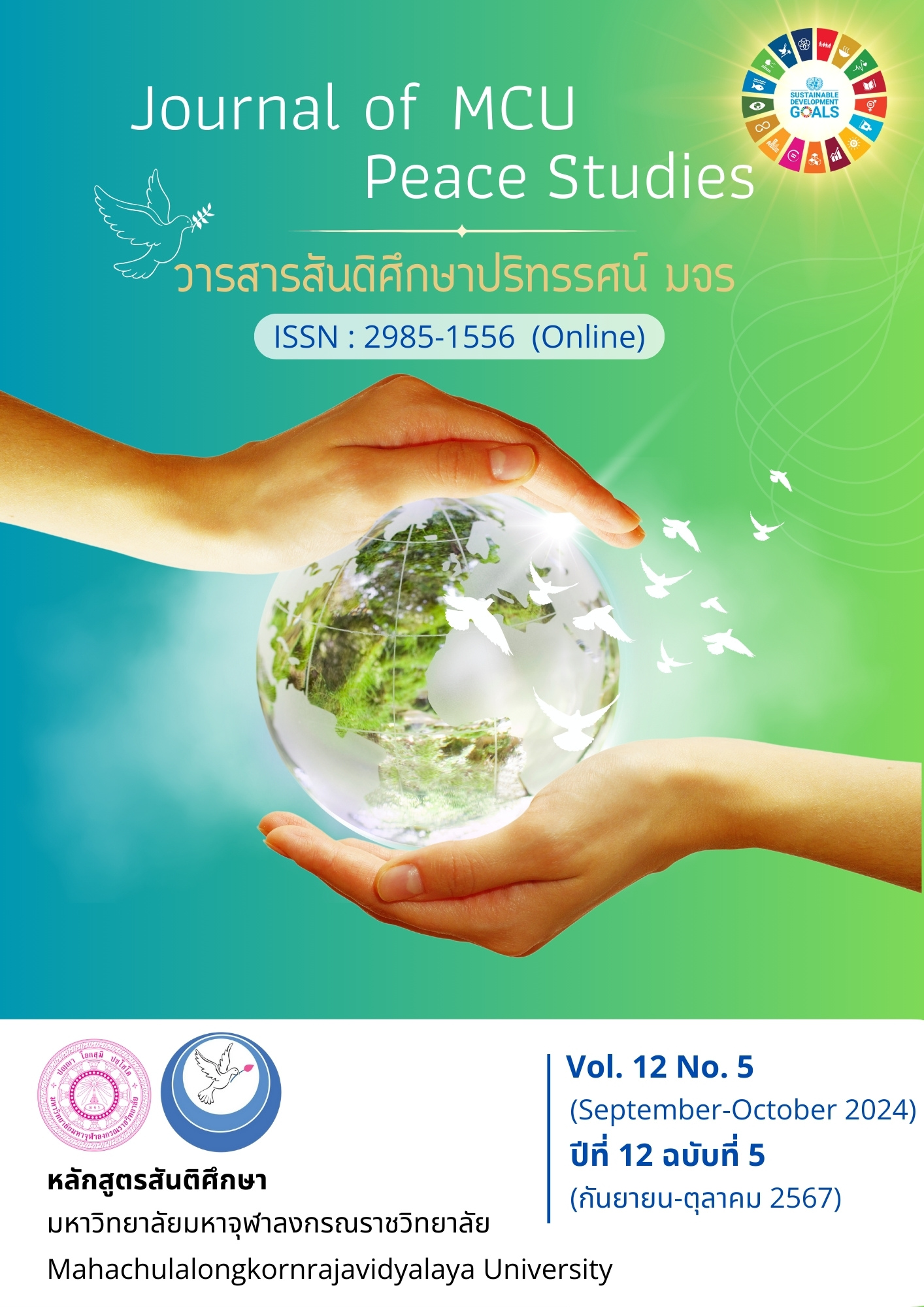คุณลักษณะภาวะผู้นำเชิงพหุวัฒนธรรมของปลัดอำเภอผู้เป็นหัวหน้าประจำตำบล ในพื้นที่จังหวัดชายแดนภาคใต้
Main Article Content
บทคัดย่อ
การวิจัยครั้งนี้มีวัตถุประสงค์เพื่อศึกษาคุณลักษณะภาวะผู้นำเชิงพหุวัฒนธรรมของปลัดอำเภอผู้เป็นหัวหน้าประจำตำบลในพื้นที่จังหวัดชายแดนภาคใต้ ซึ่งเป็นการวิจัยเชิงคุณภาพ มีกลุ่มตัวอย่าง จำนวน 34 คน ซึ่งประกอบด้วย 1) ปลัดอำเภอผู้เป็นหัวหน้าประจำตำบล ซึ่งปฏิบัติงานในพื้นที่จังหวัดชายแดนภาคใต้ที่ 2) นักวิชาการและเจ้าหน้าที่ระดับบริหารที่มีส่วนเกี่ยวข้องกับนโยบายที่นำมาเป็นแนวทางปฏิบัติในพื้นที่ 3) ผู้นำศาสนาและประชาชนทั่วไปที่นับถือศาสนาพุทธ และศาสนาอิสลาม เก็บข้อมูลด้วยวิธีการสัมภาษณ์เชิงลึกและสนทนากลุ่มโดยใช้แบบสัมภาษณ์แบบกึ่งโครงสร้างและประเด็นสนทนากลุ่มตามวัตถุประสงค์ของการวิจัย ผู้วิจัยใช้วิธีการวิเคราะห์ข้อมูลด้วยวิธีการวิเคราะห์เนื้อหา และการตีความสร้างข้อสรุป และสรุปข้อค้นพบ
ผลการวิจัยพบว่า คุณลักษณะภาวะผู้นำเชิงพหุวัฒนธรรมของปลัดอำเภอผู้เป็นหัวหน้าประจำตำบล ในพื้นที่จังหวัดชายแดนภาคใต้ที่สำคัญยิ่งมี 5 ประการ ได้แก่ คุณลักษณะที่เกี่ยวกับการสร้างความไว้เนื้อเชื่อใจ คุณลักษณะด้านความรู้ คุณลักษณะด้านทักษะ คุณลักษณะด้านทัศนคติ และคุณลักษณะที่สอดคล้องกับศาสตร์พระราชทาน คุณลักษณะดังกล่าวนั้นจะส่งผลให้การปฏิบัติงานของปลัดอำเภอผู้เป็นหัวหน้าประจำตำบลเกิดประสิทธิภาพและประสิทธิผลอย่างยิ่ง และจะเป็นปัจจัยที่สำคัญในการสร้างความสมานฉันท์และความสันติให้กับพื้นที่โดยเฉพาะพื้นที่จังหวัดชายแดนภาคใต้ที่เป็นพื้นที่ที่มีความโดดเด่นในด้านพหุวัฒนธรรม
Article Details

อนุญาตภายใต้เงื่อนไข Creative Commons Attribution-NonCommercial-NoDerivatives 4.0 International License.
ทัศนะและความคิดเห็นที่ปรากฏในบทความในวารสาร ถือเป็นความรับผิดชอบของผู้เขียนบทความนั้น และไม่ถือเป็นทัศนะและความรับผิดชอบของกองบรรณาธิการ ยินยอมว่าบทความเป็นลิขสิทธิ์ของวารสาร
เอกสารอ้างอิง
Cabinet Resolution. (2004). Report on the Implementation of the Project for District Chiefs as Heads of Government Agencies in Sub-District Administrative Organizations in the Southern Border Provinces. Bangkok: Cabinet Resolution on Criteria and Methods.
Dibben, M. R., Morris, S. E., & Lean, M. E. (2000). Situational Trust and Co-Operative Partners between Physicians and their Patients: A Theoretical Explanation Transferable from Business Partnership Practice. [Electronic Version]. QJM, 93, 55-61.
Kangpheng, S., & Kunlong, S. (2016). 21st Century Curriculum Leadership Model. Teaching Documents for Course 210208. Ayutthaya: Curriculum Management and Teaching, Mahachulalongkornrajavidyalaya University.
Maxwell, J. C. (1998). The 21 Irrefutable Law of Leadership: Follow Them and People Will Follow You. Nashville, TN: Thomas Nelson.
Ministry of Interior. (2021). Statistics Report on Complaints of Corruption and Misconduct of
Agency Officials. Bangkok: Office of the National Security Council.
Monkongpitukkul, S., Thamrongthanyawong, S., Sahapattana, P., & Jitpiromsri, S. (2016). Conflict Resolution in the 3 Southern Border Provinces of Thailand: Policy Process and Outcomes. Al-HIKMAH Journal, Fatoni University, 6(12), 35-53.
Na Nakhon, K. et al. (2012). Final Report of the Independent Truth and Reconciliation Commission of Thailand (TRCT). Retrieved May 3, 2023, from https://peaceresourcecollaborative.org/theories/justice-and-remedies/reconthailand
Nawawithakarn, S., Napapongs, W., Sornlertlamvanich, K., & Chengchao, C. (2022). The Competency Development Model for Royal Thai Police Working in Multicultural Society: A Case Study of Southern Border Provinces. Princess of Naradhiwas University Journal of Humanities and Social Sciences, 9(1), 1-20.
Pongsapich, A. (2003). Cultural Diversity and Coexistence in Asia. Asian Review, 16, 171-188.
Ramsey, P. G., & Williams, L. R. (2003). Multicultural Education: A Source Book. (2nd ed.). New York: Routledge Falmer.
Romney, A. K., Batchelder, W. H., & Weller, S. C. (1987). Recent Applications of Cultural Consensus Theory. American Behavioral Scientist, 31(2), 163-177.
Seedam, I. (2010). Factors Affecting the Implementation of the Peace Building Process in the Four Southernmost Provinces of Thailand Policy: A Case Study of Pattani Province. Parichart Journal, 25(2), 91-104.
Siruntawineti, P. (2015). Desirable Attributes of Government Officers in Southern Border Provinces of Thailand. Bangkok: Chulalongkorn University.
Sleeter, C. E., & Grant, C. A. (2003). Making Choices for Multicultural Education: Five Approaches to Race, Class and Gender. (4th ed.). New York: John Wiley & Sons.
Sri-in, S., & Kriwichai, P. (2010). Interactions among Religions' Followers at Tambon Kamphuan, Amphoe Suksamran, Ranong Province. Kasetsart Journal of Social Sciences, 31(2), 182-193.
Tepsing, P., Laeheem, K., & Azizskul, H. (2020). Conditions Enhancing the Role of Buddhist Monks and Islamic Religious Leaders to Strengthen the Relationship between Muslims and Buddhists in the Three Southern Border Provinces. Academic Journal of Humanities and Social Sciences Burapha University, 28(2), 164-190.
The Development Potential of the Community to Create Sustainable Economic Foundations. (2022). Report on the Unrest Situation in the Southern Border Provinces. Bangkok: Community Organizations Development Institute.
Wattanasap, W. (2007). Conflict: Principles and Problem Solving Tools. Nonthaburi: King Prajadhipok's Institute.


